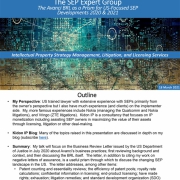Disclosures and Enforceability of Standard-Essential Patents: An Overview
 I am very pleased that my chapter comparing how three different courts approach IPR disclosure obligations under ETSI has been published by Wolters Kluwer in their 2021 Licensing Update. My chapter discusses how antitrust and implied waiver doctrines have impacted the rules and laws related to when an IPR owner member of a standards development organization (SDO) can, should, must disclosure that their IPR is potentially a standard essential patent (SEP). The chapter looks that the Rambus and Core Wireless cases in the US and compares them to the Phillips v. Asus cases in Holland.
I am very pleased that my chapter comparing how three different courts approach IPR disclosure obligations under ETSI has been published by Wolters Kluwer in their 2021 Licensing Update. My chapter discusses how antitrust and implied waiver doctrines have impacted the rules and laws related to when an IPR owner member of a standards development organization (SDO) can, should, must disclosure that their IPR is potentially a standard essential patent (SEP). The chapter looks that the Rambus and Core Wireless cases in the US and compares them to the Phillips v. Asus cases in Holland.

My conclusion is as follows:
Disclosures of potentially standard-essential patents and patent applications have for long been a topic of little interest for third parties to the collaborative standardization process. Yet, developments over the past two decades suggest that regulators and courts have taken a more intense interest in issues around these declarations. Such interest is expressed most prominently in the antitrust enforcement actions of the late 2000s on the basis of the so-called ‘patent ambush’ theory, as well as in the recent ruling delivered by the US Court of Appeals for the Federal Circuit in Core Wireless resting on the ‘implied waiver’ doctrine.
However, these policy initiatives and rulings by the Federal Circuit are open to criticism for failing to ground themselves firmly on standardization realities and prevailing practices on the ground. As such, public policy interventions which suffer from deficient information regarding the actual working of collaborative standardization are liable to produce undesirable and unintended consequences. One such consequence is the stripping of most patent holders’ IPR rights, with an extremely detrimental cost on innovation. Such cost, moreover, is unlikely to provide actual benefits for users, because there is scant evidence that current disclosure practices and SDO rules hamper standardization and broad standards adoption in any sense.
A further pernicious effect potentially resulting from misguided policy action is the disruption of the equilibrium between technology contributors and users within SDOs. SDO IPRs policies are formulated through rule making processes that are themselves transparent and based on consensus of all interested parties. As such they reflect the balance of interests of individual SDO stakeholders at a particular point and external intervention may destabilize this delicate balance.
In contrast, the Philips v. Asus judgment by the Court of Appeal of The Hague points to a different and more appropriate route, that of restraint and deference to rules and practices that have survived the test of time. The ruling also shows that decision makers that pay an adequately close look at SDO rules and prevailing practices can arrive at outcomes that are sensible, fair, and conducive to the efficient functioning of the market for standards.











